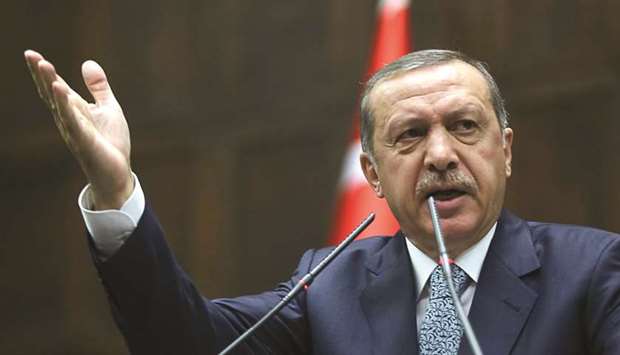“The decisions delivered by the European Court of Human Rights (ECHR) do not bind us,” he was quoted as saying by the state-run Anadolu news agency after a meeting of his ruling party.
“There are many things we can do in response. We’ll make our counter move and finish the job,” Erdogan told reporters in parliament, without elaborating.
Justice Minister Abdulhamit Gul said the final decision on Demirtas’s cases would be made by the Turkish judiciary.
Demirtas, one of two former co-leaders of the leftist Peoples’ Democratic Party (HDP), was arrested in November 2016 over his alleged links to Kurdish militants.
The 45-year-old, dubbed the Kurdish Obama, is charged with a string of offences, including terrorist propaganda, for which he faces up to 142 years’ imprisonment.
He denies all the charges and claims the case against him is politically motivated.
In a ruling keenly awaited by his supporters, the ECHR in the French city of Strasbourg said it accepted that Demirtas had been arrested on “reasonable suspicion” of committing a crime.
However, it said that the reasons given for keeping him behind bars were not “sufficient”.
Demirtas was unable to fulfill his duties as an MP, the court noted, calling it “an unjustified interference with the free expression of the opinion of the people and with his right to be elected and to sit in parliament”.
The extension of his detention – during an April 2017 referendum on expanding Erdogan’s powers and June 2018 presidential polls in which Demirtas ran as a candidate – was aimed at “stifling pluralism and limiting freedom of political debate, which was at the very core of the concept of a democratic society”, the judges added.
“The court therefore held, unanimously, that the respondent state was to take all necessary measures to put an end to the applicant’s pre-trial detention,” and ordered Turkey to pay Demirtas €10,000 ($11,500) in damages and €15,000 towards his legal costs.
Following the ruling, Demirtas’ lawyer, Mahsuni Karaman, said he had applied for the politician’s immediate release at a criminal court in Ankara.
A Turkish judge on the seven-justice ECHR panel, Isil Karakas, expressed a partly dissenting view from the majority opinion, saying that it was not clear that Demirtas’s detention was politically motivated.
Demirtas and former fellow HDP co-leader Figen Yuksekdag were among 12 MPs jailed in November 2016 as part of a mass crackdown after a failed coup in July 2016.
Tens of thousands of people, including politicians, academics and journalists, were arrested under a two-year state of emergency.
In June, Demirtas ran for president from prison, coming third with 8.4% of the vote behind Erdogan and Muharrem Ince, candidate of the main opposition group, the Republican People’s Party (CHP).
The ECHR ruling becomes binding on Turkey, a member state of the Council of Europe, within three months once it is final – unless the court’s expanded Grand Chamber agrees to hear an appeal from either side.
Turkey has in the past usually complied with its findings.
Erdogan said Turkey would take steps against the ruling, arguing that the ECHR “was never able to come and curb terror in Turkey. Terror continued and it continues likewise right now”.
Erdogan’s claim that Turkey will not be bound by its latest decision is likely to add to tensions between Ankara and the Council of Europe, the pan-European rights body that oversees the ECHR.
“Under Article 46 of the convention all member states are bound by the rulings of the court,” a spokesman for the 47-nation council said yesterday.
In February, the council’s chief Thorbjorn Jagland warned Turkey against “casting the net too widely” in the mass crackdown that followed the failed 2016 coup, saying the situation had resulted in a backlog of rights complaints at the ECHR.

